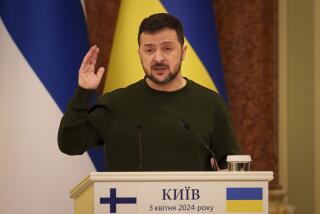Russia Targets Corrupt Police in Crackdown
- Share via
MOSCOW — Corrupt police linked with gangsters have been planting false evidence on their victims and then extorting bribes from them, Interior Minister Boris Gryzlov said Monday as a wave of arrests targeted the group.
These “wolves in sheep’s clothing” include agents of the criminal investigation department of the Moscow city police, Gryzlov told reporters, adding that they have “planted handguns and drugs, instituted criminal investigations and then extorted money for closing them.”
“Some people were taken into custody on the basis of forged evidence,” he said.
Gryzlov portrayed the searches and arrests as the first step in a “war on organized crime and corruption,” which he proclaimed Friday during a visit to the southern city of Rostov-on-Don.
Links among the worlds of business, crime, law enforcement and government are believed to be common in Russia. Prominent businessmen and politicians are often the targets of gangland-style executions, which are blamed on conflicts over money and are rarely solved.
On a lighter note that also reflects reality, Moscow handicraft markets sell wooden vodka-bottle holders carved in the shape of traffic policemen, their fists stuffed with bribe money.
“I am extremely worried by a situation in which crime and representatives of law enforcement bodies and authority are tied by a criminal chain,” Gryzlov said in announcing the crackdown. “We declare a war on organized crime, and neither ranks nor titles have significance. No one is immune.”
Russians spend about $37 billion annually on bribes and kickbacks, the INDEM Center for Applied Political Studies, a leading Moscow think tank, estimated last year.
At least seven arrests were made Monday, as officers in a special task force broke into apartments where suspects had barricaded themselves, Russian media reported.
More than 130 officers are suspected of being members of the extortion group, the Russian news agency Itar-Tass said.
“It is an unprecedented operation,” Moscow police spokesman Kirill Sharov said in an interview. “More arrests should be expected in the near future. It is just the beginning.”
Russian media said that among those arrested were Yuri Samolkin and Vladimir Lysakov, deputy chiefs of the Moscow Police Department’s section on arms trafficking. Three senior detectives in the section also were arrested. Samolkin and one of the detectives, Nikolai Dyomin, were detained after the storming of a locked apartment, the Interfax news agency reported.
Also arrested was Lt. Gen. Vladimir Ganeyev, chief of the Emergency Situations Ministry’s internal security service, who is suspected of being a ringleader, Russian media said.
More than $3 million in cash was confiscated from the suspects, Interfax reported.
Svetlana Glinkina, a criminologist who is deputy director of the Institute of International Economic and Political Studies, called the arrests “a very positive step which will be most enthusiastically perceived by society.”
“When people hear of such operations they begin to feel more secure,” she said. “Let’s hope that this is not just a campaign for the sake of campaigning but the beginning of a large-scale plan to eradicate corruption within the law enforcement structures. The police ranks in our country are in acute need of a serious cleansing.”
Investigators believe that the extortion ring was centered in Moscow but also operated in other parts of the country. It is suspected of more than 100 cases of falsification of evidence, Gryzlov said. Investigators are also checking for possible involvement in contract murders and armed robbery, he said.
“We hope to analyze in detail all the false criminal cases in the near future,” Gryzlov said. “The victims will be acquitted.”
Officers from several law enforcement bodies and soldiers formed the group’s core, Gryzlov said. It cooperated with criminal organizations to extort large sums of money, blackmailing casinos, restaurants and other enterprises by threatening violence, he said.
The group also set up a private guard company as part of this protection racket, Gryzlov charged. Money was laundered through commercial firms and a specially established foundation, he said.
*
Times staff writer Sergei L. Loiko contributed to this report.
More to Read
Sign up for Essential California
The most important California stories and recommendations in your inbox every morning.
You may occasionally receive promotional content from the Los Angeles Times.













